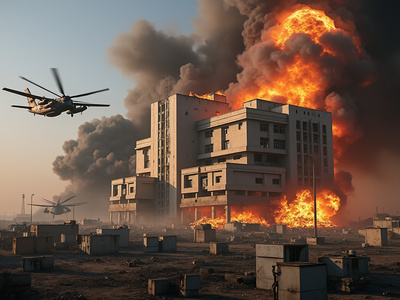
US Military Strikes Against Houthis Indicate Rising Tensions in Yemen
Recent American strikes complicate the peace efforts in Yemen amid discussions on broader regional conflicts.
The United States has intensified its military operations against Houthi forces in Yemen, commencing a new series of airstrikes in mid-March 2025. This escalation is justified by Washington as a response to perceived threats posed by the Houthis to maritime navigation in the Red Sea, a crucial shipping route for global trade.
In a recent communication, U.S. President Donald Trump revealed a dialogue with Egyptian President Abdel Fattah el-Sissi, wherein they discussed the ongoing military actions against the Houthis and potential strategies to restore calm in the region.
The U.S. administration maintains that the operations are critical to safeguarding international shipping lanes, particularly those traversing the Red Sea.
Amid these developments, there are rising concerns regarding the 10-year conflict in Yemen, compounded by the complexities of involving military force in peace negotiations.
Experts indicate that sustainable peace cannot be achieved solely through military means, emphasizing the necessity for inclusive diplomatic efforts involving all parties, including local stakeholders.
In parallel, recent discussions among international players have focused on stabilizing the broader Middle East, including the ongoing humanitarian crisis in Gaza.
The discourse around restarting peace negotiations in Yemen has intensified, with assessments highlighting the urgent need for comprehensive talks that encompass not only military stability but also humanitarian and economic considerations.
The United Nations has reiterated its commitment to facilitating dialogue aimed at ending the civil war in Yemen, which has led to one of the world's worst humanitarian crises.
The U.N. emphasizes that resolving the Yemeni conflict requires a multifaceted approach, addressing the underlying grievances that have fueled the conflict.
Moreover, continuous U.S. military actions raise questions about the implications for regional stability.
The Houthis have threatened to retaliate against U.S. interests, further complicating an already volatile situation.
Analysts caution that without a concerted diplomatic push, military strikes could exacerbate the humanitarian situation and obstruct efforts toward a peaceful resolution.
As military operations progress, both regional actors and international stakeholders are urged to reevaluate their strategies and prioritize diplomatic engagement alongside military responses, particularly in light of the ongoing humanitarian crises in affected regions.
In a recent communication, U.S. President Donald Trump revealed a dialogue with Egyptian President Abdel Fattah el-Sissi, wherein they discussed the ongoing military actions against the Houthis and potential strategies to restore calm in the region.
The U.S. administration maintains that the operations are critical to safeguarding international shipping lanes, particularly those traversing the Red Sea.
Amid these developments, there are rising concerns regarding the 10-year conflict in Yemen, compounded by the complexities of involving military force in peace negotiations.
Experts indicate that sustainable peace cannot be achieved solely through military means, emphasizing the necessity for inclusive diplomatic efforts involving all parties, including local stakeholders.
In parallel, recent discussions among international players have focused on stabilizing the broader Middle East, including the ongoing humanitarian crisis in Gaza.
The discourse around restarting peace negotiations in Yemen has intensified, with assessments highlighting the urgent need for comprehensive talks that encompass not only military stability but also humanitarian and economic considerations.
The United Nations has reiterated its commitment to facilitating dialogue aimed at ending the civil war in Yemen, which has led to one of the world's worst humanitarian crises.
The U.N. emphasizes that resolving the Yemeni conflict requires a multifaceted approach, addressing the underlying grievances that have fueled the conflict.
Moreover, continuous U.S. military actions raise questions about the implications for regional stability.
The Houthis have threatened to retaliate against U.S. interests, further complicating an already volatile situation.
Analysts caution that without a concerted diplomatic push, military strikes could exacerbate the humanitarian situation and obstruct efforts toward a peaceful resolution.
As military operations progress, both regional actors and international stakeholders are urged to reevaluate their strategies and prioritize diplomatic engagement alongside military responses, particularly in light of the ongoing humanitarian crises in affected regions.









